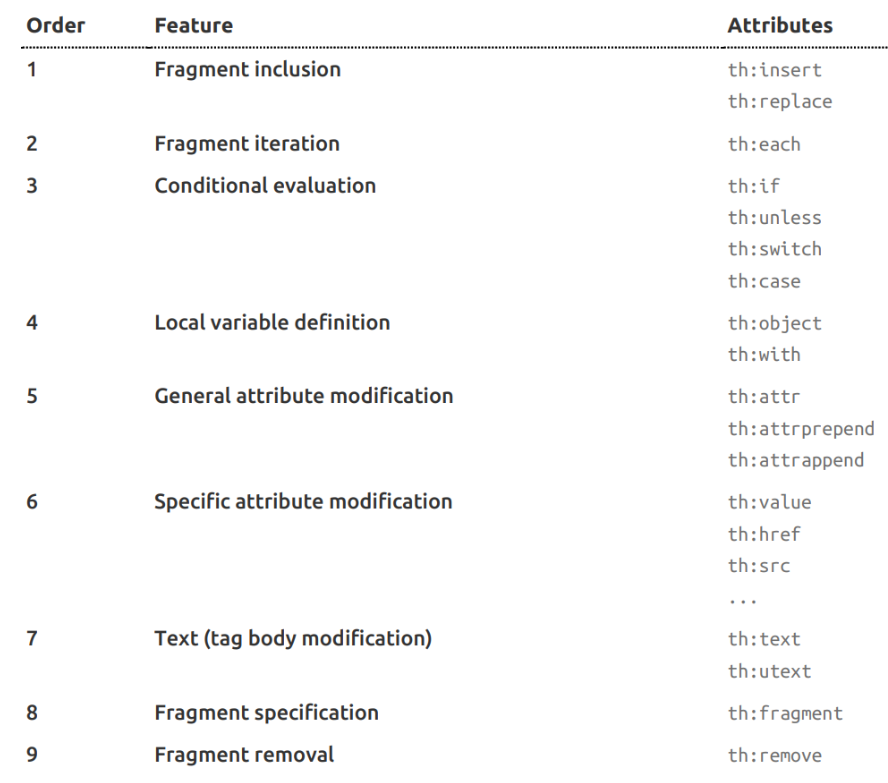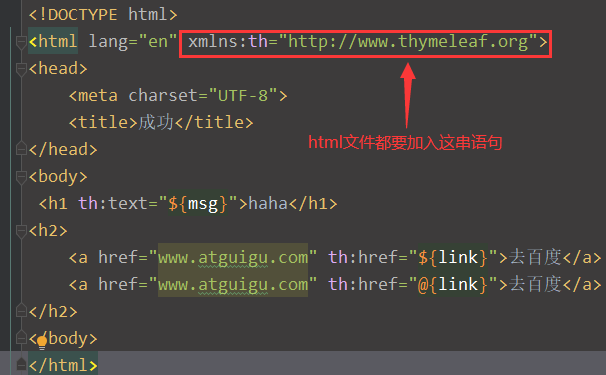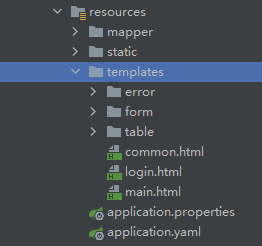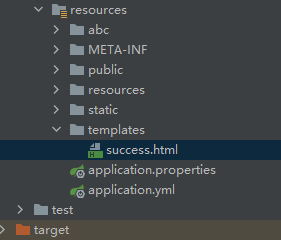3.1 thymeleaf简介
Thymeleaf is a modern server-side Java template engine for both web and standalone environments, capable of processing HTML, XML, JavaScript, CSS and even plain text.
现代化、服务端Java模板引擎
3.2 基本语法
3.2.1 表达式
3.2.2 字面量
文本值: ‘one text’ , ‘Another one!’ ,…数字: 0 , 34 , 3.0 , 12.3 ,…布尔值: true , false
空值: null
变量: one,two,…. 变量不能有空格
3.2.3 文本操作
字符串拼接: +
变量替换: |The name is ${name}|
3.2.4 数学运算
运算符: + , - , * , / , %
3.2.5 布尔运算
运算符: and , or
一元运算: ! , not
3.2.6 比较运算
比较: > , < , >= , <= ( gt , lt , ge , le )等式: == , != ( eq , ne )
3.2.7 条件运算
If-then: (if) ? (then)
If-then-else: (if) ? (then) : (else)
Default: (value) ?: (defaultvalue)
3.2.8 特殊操作
无操作: _
3.3 设置属性值-th:attr
设置单个值
<form action="subscribe.html" th:attr="action=@{/subscribe}"><fieldset><input type="text" name="email" /><input type="submit" value="Subscribe!" th:attr="value=#{subscribe.submit}"/></fieldset></form>
设置多个值
<img src="../../images/gtvglogo.png" th:attr="src=@{/images/gtvglogo.png},title=#{logo},alt=#{logo}" />
以上两个的代替写法 th:xxxx
<input type="submit" value="Subscribe!" th:value="#{subscribe.submit}"/>
<form action="subscribe.html" th:action="@{/subscribe}">
所有h5兼容的标签写法
https://www.thymeleaf.org/doc/tutorials/3.0/usingthymeleaf.html#setting-value-to-specific-attributes
3.4 遍历
<tr th:each="prod : ${prods}">
<td th:text="${prod.name}">Onions</td>
<td th:text="${prod.price}">2.41</td>
<td th:text="${prod.inStock}? #{true} : #{false}">yes</td>
</tr>
<tr th:each="prod,iterStat : ${prods}" th:class="${iterStat.odd}? 'odd'">
<td th:text="${prod.name}">Onions</td>
<td th:text="${prod.price}">2.41</td>
<td th:text="${prod.inStock}? #{true} : #{false}">yes</td>
</tr>
3.5 条件运算
<a href="comments.html"
th:href="@{/product/comments(prodId=${prod.id})}"
th:if="${not #lists.isEmpty(prod.comments)}">view</a>
<div th:switch="${user.role}">
<p th:case="'admin'">User is an administrator</p>
<p th:case="#{roles.manager}">User is a manager</p>
<p th:case="*">User is some other thing</p>
</div>
3.6 属性优先级

3.7 thymeleaf的使用
1. 引入Starter
<dependency>
<groupId>org.springframework.boot</groupId>
<artifactId>spring-boot-starter-thymeleaf</artifactId>
</dependency>
2. 自动配置好了thymeleaf
@Configuration(proxyBeanMethods = false)
@EnableConfigurationProperties(ThymeleafProperties.class)
@ConditionalOnClass({ TemplateMode.class, SpringTemplateEngine.class })
@AutoConfigureAfter({ WebMvcAutoConfiguration.class, WebFluxAutoConfiguration.class })
public class ThymeleafAutoConfiguration { }
自动配好的策略
- 1、所有thymeleaf的配置值都在 ThymeleafProperties
- 2、配置好了 SpringTemplateEngine
- 3、配好了 ThymeleafViewResolver
4、我们只需要直接开发页面
public static final String DEFAULT_PREFIX = "classpath:/templates/"; public static final String DEFAULT_SUFFIX = ".html"; //xxx.html3. 页面开发
①页面放到templates文件夹中:
②添加提示功能:

<!DOCTYPE html> <html lang="en" xmlns:th="http://www.thymeleaf.org"> <head> <meta charset="UTF-8"> <title>Title</title> </head> <body> <h1 th:text="${msg}">哈哈</h1> <h2> <a href="www.atguigu.com" th:href="${link}">去百度</a> <br/> <a href="www.atguigu.com" th:href="@{link}">去百度2</a> </h2> </body> </html>③使访问路径必须以/world开始,@{}也会自动把world加入进去
server: servlet: context-path: /world④前缀和后缀会自动拼接跳转到login.html页面
/** * 登录页面 * @return */ @GetMapping(value = {"/","/login"}) public String loginPage(){ return "login"; }
⑤标签行内写法



